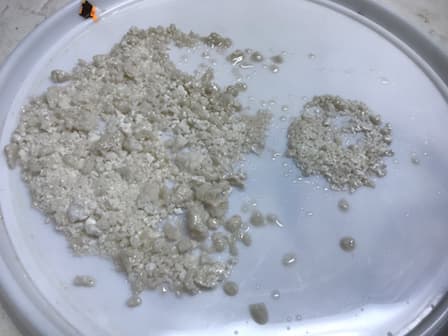
Curated with aloha by
Ted Mooney, P.E. RET

The authoritative public forum
for Metal Finishing 1989-2025

-----
How to make Zinc Chloride
February 19, 2021
Q. Problem making anhydrous zinc chloride: Deliquescence!
Hi, I have started experimenting trying to make my own anhydrous zinc chloride.
So, everything goes well up until the aqueous solution is evaporated to make the salts, once the salt is made it starts to absorb moisture and returns to aqueous form.


What extra additions or process should I do to make the salts remain in a dry state?
Joshua Gonsalves- Port of Spain, Trinidad and Tobago
⇩ Related postings, oldest first ⇩
Q. Hi,
We use zinc chloride in one of our processes. We have recently had problems obtaining zinc chloride that would meet USP specifications. We performed the following additional test: * dissolved 100 g of material in 250 mL of 4 N hydrochloric acid. * filtered acid solution through 0.4 µ polycarbonate filter.
We observed particles ranging in size from 20 µ to tenths of a mm. An IR scan would indicate the presence of a basalt-like material. Would it be normal to find this type of material in Zinc Chloride USP?
Thanks,
Michael J. Shifflet- Lititz, PA USA
2003
A. Even we will like to know as to how to obtain Zinc Chloride Anhydrous Powder that is practically frww from Oxychloride or Oxides. A clear solution of Zinc Chloride in water on drying develops the oxide or oxychloride.
Aamir Kamdar- Bombay, India
2003
Making Zinc Chloride from Zinc Oxide
Q. I am a student trying to make compounds for winter break. Right now, I am trying to make Zinc Chloride from a mixture of zinc oxide ⇦ this on eBay or Amazon [affil links] and Zinc. I'm wondering if anyone has some tricks to do this efficiently.
Adam SmithStudent - Chicago, Illinois, USA
2007
2007
A. Dissolve it in a minimum quantity of reagent grade hydrochloric acid, filter, then evaporate the filtrate to a syrupy consistency in a very well ventilated place. Then, dry for a prolonged period over anhydrous Calcium chloride, turning it over a lot, until you get a solid.
It is very hygroscopic (water loving) and quite difficult to get really dry.

Dave Wichern
Consultant - The Bronx, New York
Q, A, or Comment on THIS thread -or- Start a NEW Thread